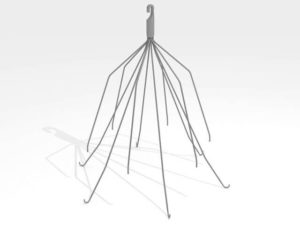
Loncar Lyon Jenkins Is Now Filing IVC Filter Lawsuits in Order to Ensure Victims of IVC Filter Defects Receive Compensation
Inferior Vena Cava (IVC) filters are devices implanted in the veins of patients who suffer from the threat of pulmonary embolism, heart attack, and/or stroke due to blood clots. IVC filters act to catch the blood clots as they travel through the bloodstream. Certain IVC filters are permanent, while others are designed to be retrievable. Because they are often used in trauma care, surgery, and during childbirth, many patients do not know if they have a filter until there is a problem.
Since their introduction in 2000, IVC filters have been plagued with problems, and the U.S. Food and Drug Administration (FDA) has received in excess of one thousand reports of adverse events due to the devices.
If you or someone you love was among those needlessly injured as a result of an IVC filter, you may be eligible for compensation. Even if your filter is functioning properly, your rights may be impacted by recent court decisions and medical studies. Loncar Lyon Jenkins is investigating cases in all 50 states.
You can contact our team at Loncar Lyon Jenkins immediately for a free, confidential case evaluation using the form on the side or by calling our toll-free number. Our attorneys are handling IVC filter lawsuits on a contingency-fee basis, meaning you pay nothing unless a recovery is obtained.

800-285-HURT (4878)Available 24/7 | 356 Days | se habla español
December 2021 Update: FDA Approves New Device to Assist in IVC Filter Removal
FDA administrators have recently approved the marketing and promotion of a new laser device designed to remove IVC filters. By fostering the removal of tissue, the Philips CavaClear Laser Sheath will ease detachment and removal of the filter even in cases where previous efforts at removal have failed.
According to the recent FDA news release: “The Philips CavaClear Laser Sheath was granted a Breakthrough Device Designation for the removal of IVC filters.” This program accelerates the development and assessment of medical devices that foster treatment and diagnosis of potentially fatal or irreversible medical conditions.
How the Philips CavaClear Laser Sheath Works
This new device will combat the previously limited choices for effectively removing these devices. In the past, many IVC filters have been permanently implanted. However, FDA safety communications recommend removal of the device once blood clots no longer threaten the recipient’s health.
The newly authorized device, the Philips CavaClear Laser Sheath, removes difficult-to-remove IVC filters via ultraviolet laser energy to facilitate more effective removal from the surrounding tissue. Not a standalone alternative, the device is intended for use alongside traditional snare devices for IVC filter removal.
Studies on the Philips CavaClear Laser Sheath
FDA’s safety and effectiveness evaluated device-assisted removal in 265 patients. The study indicated:
- 96% successful IVC filter removals
- 3% significantly complicated removals
Significant complications that might result from use of the laser can include bleeding, development of hematomas, and filter breakage. For this reason, use of the device is not recommended for:
- Patients who are still experiencing blood clots
- When the previously implanted filter is not easily accessible
- When the filter was manufactured of nonmetal material
- Removal of Bird’s Nest IVC filters or VenaTech IVC filters
July 2015 Update: FDA Issues Warning Letter to C.R. Bard
On July 13, 2015, the FDA issued a warning letter to C.R. Bard for misfiling customer complaints (including the report of a patient death), manufacturing the Recovery Cone Removal System without the required clearance or approval, and failing to inform the agency of serious device malfunctions.
The FDA stated that model RC-15 of the Recovery Cone was not included in the clearance of their IVC filters. In addition, the warning letter stated that the model FBRC violates the Federal Food, Drug, and Cosmetic Act because they “introduced or delivered into interstate commerce for commercial distribution a device with major changes/modifications to the intended use without submitting a new premarket notification to the agency as required by section 510(k)”.
The letter also raises concerns about Bard’s adherence to Quality System Regulations at its Tempe facility. For instance, a complaint related to the G2 IVC filter regarding embolization of a detached filter arm “was filed as a malfunction Medical Device Report [MDR] and should have been filed as a death.” The FDA stated other complaints were also misfiled, and some did not contain enough information.
The Tempe facility was also cited for violating Medical Device Reporting requirements. This means the plant failed to inform the FDA within 30 days of receiving complaints or information suggesting that one of its devices had malfunctioned and was likely to lead to death or serious injury.

800-285-HURT (4878)Available 24/7 | 356 Days | se habla español
April 2015 Update: Study Disputes Effectiveness of IVC Filters
On April 28, 2015, a study published in the Journal of the American Medical Association (JAMA) found that IVC filters were not as effective as blood thinners at preventing pulmonary embolism. An excerpt from the study’s conclusion reads:
Among hospitalized patients with severe acute pulmonary embolism, the use of a retrievable inferior vena cava filter plus anticoagulation compared with anticoagulation alone did not reduce the risk of a symptomatic recurrent pulmonary embolism at 3 months. These findings do not support the use of this type of filter in patients who can be treated with anticoagulation.
Based on this study, there is no reason for patients who can be treated with blood thinners to have used removable IVC filters.
May 2014 Update: FDA Safety Communication
On May 6, 2014, the FDA provided an update to their August 2010 safety communication. In their statement, the FDA announced concern that retrievable IVC filters, when placed for a short-term risk of pulmonary embolism, are not always removed once the risk subsides.
The FDA recommended that implanting physicians and clinicians responsible for the ongoing care of patients with retrievable IVC filters consider removing the filter as soon as protection from pulmonary embolism is no longer needed. Based upon their own quantitative analysis and mathematical model, if the patient’s transient risk for pulmonary embolism has passed, the risk/benefit profile begins to favor removal of the IVC filter between 29 and 54 days after implantation.
Timely removal of the filter becomes problematic when a patient is not aware that an IVC filter was ever implanted. Other patients are not notified as to whether or not the filter they had implanted is a permanent or retrievable filter.
August 2010 Update: Initial FDA Safety Communication
In August 2010, the FDA released an initial safety communication stating that they had received 921 device adverse reports. In the reports, 328 involved device migration, 146 involved embolization (detachment of device components), 70 involved perforation of the IVC, and 56 involved filter fracture. These severely painful events can cause:
- Lower limb deep vein thrombosis (DVT)
- IVC perforation
- Heart and lungs perforation
- Other life-threatening complications
As a result of this study, the FDA recommends that implanting physicians and clinicians responsible for the ongoing care of patients with retrievable IVC filters consider removing the filter as soon as protection from pulmonary embolism is no longer needed.
IVC Filters & Manufacturers
Many companies manufacture permanent and retrievable IVC filters. Loncar Lyon Jenkins is currently litigating cases involving retrievable IVC filters manufactured by C. R. Bard, Inc. and Cook Medical, Inc., including:
- The Bard Recovery
- The Bard G2
- The Bard G2 Express
- Cook Gunther Tulip
- Cook Celect
Other retrievable IVC filters and manufacturers under review by Loncar Lyon Jenkins include:
- B Braun Tempofilter
- Cordis OptEase
- ALN
- Rex Medical Options
- Rafael Medical
Boston Scientific’s Greenfield™ filter is a permanent filter and not one that Loncar Lyon Jenkins is currently litigating. However, physicians often use the term “greenfield filter” generically to refer to any IVC filter—both the permanent and retrievable filters. If your physician has told you or you recall hearing a physician refer to your filter as a “greenfield filter,” that does not necessarily mean that you have a Boston Scientific Greenfield™ filter.
There is no risk in allowing our team at Loncar Lyon Jenkins to obtain the hospital records to determine the manufacturer and model of your filter. If your filter is not one we are handling, we will mail you a copy of your records, close your file, and charge nothing for our review of your case.
Mounting Evidence of IVC Filter Defects
The Bard Recovery IVC Filter and the Bard G2 IVC Filter system were both approved for sale under the FDA’s 510(k) protocol. The 510(k) approval allowed for clearance of the device without human clinical trials. The Bard Recovery IVC filter was first introduced in 2003 and only two years later was pulled from the market on the heels of damaging studies. It was then superseded by the Bard G2 IVC filter system.
Unfortunately, studies on the new G2 filter have also shown a proneness to fracturing and migration. One such study was published in the Journal of the American Medical Association in 2013. The study analyzed 978 patients from August 2003 to February 2011. Highlights from the study include:
- 679 retrievable IVC filters that were placed, while 58 (8.5%) were successfully removed.
- Unsuccessful retrieval attempts were made in 13 patients (18.3% of attempts).
- Many IVC filters placed after trauma were inserted when the highest bleeding risk had subsided, and anticoagulant therapy may have been appropriate.
- While many of these filters were placed because of a perceived contraindication to anticoagulants, 237 patients (24.9%) were discharged on a regimen of anticoagulant therapy.
The study concluded that the use of IVC filters for prophylaxis and treatment of venous thrombotic events, combined with a low retrieval rate and inconsistent use of anticoagulant therapy, results in suboptimal outcomes due to high rates of venous thromboembolism.
Symptoms of IVC Filter Failure
- Severe pain in the lungs, heart, or other major areas
- Respiratory compromise (respiratory insufficiency, arrest, and failure)
- Pulmonary embolus (blockage of an artery in the lungs)
- Hemorrhaging
- Perforation of vessels, tissue, and organs
- Death
IVC Filter lawsuits seek to compensate victims for expensive medical bills, lost income from time off work, and emotional distress from these complications. The lawsuits filed claim that the manufacturers knew or should have known about the risk of severe damage before marketing their product. The manufacturers failed to properly warn patients about the risk of implanting an IVC filter, unnecessarily injuring thousands of Americans.
Potential Compensation From an IVC Filter Lawsuit
Since July 2019, more than 14,000 lawsuits have been filed against various manufacturers of IVC filters. Several cases have already resulted in substantial financial awards for the injured party.
If you or someone you love seeks monetary damages by filing an IVC filter lawsuit or joining an existing one, potential compensation can include:
- Medical and rehabilitation bills
- Required in-home medical support
- Loss of wages and of future earnings
- Physical pain and suffering
- Mental and emotional anguish
Wrongful death cases related to IVC filter use, implantation, or defects could result in additional varying wrongful death damages. If your case meets the parameters for punitive damages, our lawyer will explain how you can request this compensation as well.
Do Not Trust Your Case to an Inexperienced Form or Referral Service
Our client-focused law firm fights hard to recover damages for those injured by IVC filters. We work hard to provide ongoing legal support for clients injured by medical devices. The result is reviews like this one from those we’ve helped:
“My experience from start to finish was nothing but great. Mrs. Hernandez was a key person in my case, she was very thoughtful, helpful and helped me get what I needed. I would definitely recommend them for all your legal needs!” — Linda Stackhouse
Loncar Lyon Jenkins is a law firm that has been at the forefront of pharmaceutical and medical device litigation nationwide since 1999, successfully resolving thousands of cases in that time. We have been investigating cases involving IVC filter injuries as early as 2011. Even if your filter is functioning properly, you should contact Loncar Lyon Jenkins immediately to discuss your rights.
Contact Our Loncar Lyon Jenkins IVC Filter Team Today
If you or someone you love were among those needlessly injured as a result of an IVC filter, you may be eligible for compensation. If you have suffered from filter migration, filter fracture, or organ perforation, the law limits your time to act. Contact Loncar Lyon Jenkins immediately for a free, confidential case evaluation using the form on the side or by calling our toll-free number.
For more information on the IVC filter issue, click here to watch NBC’s reporting on the problem.

















